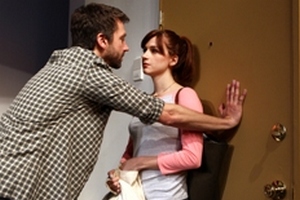SITE GUIDE
SEARCH
REVIEWS
REVIEW ARCHIVES
ADVERTISING AT CURTAINUP
FEATURES
NEWS
Etcetera and
Short Term Listings
LISTINGS
Broadway
Off-Broadway
NYC Restaurants
BOOKS and CDs
OTHER PLACES
Berkshires
London
California
New Jersey
Philadelphia
Elsewhere
QUOTES
TKTS
PLAYWRIGHTS' ALBUMS
LETTERS TO EDITOR
FILM
LINKS
MISCELLANEOUS
Free Updates
Masthead
A CurtainUp Los Angeles Review
Trudy and Max in Love
By Jon Magaril
|
"Love is a fiction people make up to assuage their guilt about having sex." .— Max
|

Michael Weston, Aya Cash (Photo: Debora Robinson)
|
In this commission from the enduringly essential South Coast Rep, Max and Trudy (Zoe likes names that connote effervescent quirks) shouldn't be in love. She's married, not unhappily, to Cliff, whose political work keeps him out of town often (and off-stage always). The play doesn't question whether the new attachment is love; the title alone takes care of that. Instead, Trudy grapples with not only whether to choose one man over the other but also the nature of love itself.
As with Ruby Sparks, Kazan has a facility for ideas that tantalize as they stylize. In the film, former wunderkind Calvin suffers from a years-long writer's block after having made his mark with a popular and well-received first novel. He's saved by Ruby, a muse who does whatever he writes until Calvin lets her know she's a mere product of his imagination.
The play isn't as high concept, but its structure deftly mirrors the duo's interior lives. Trudy and Max may be two for the seesaw of love, but lots of other folk populate their playground. There are several members of the Brooklyn writer's room where the couple first flirt, her therapist, her best friend, the wait person/acquaintance in her local hangout, and his best friend.
The charming Aya Cash and Michael Weston inhabit the title characters, while Tate Ellington and Celeste Den play everyone else. This not only keeps production costs down; it illustrates how love renders everyone outside the pair indistinguishable. They only have eyes for each other.
As such, the play might benefit by giving more equal weight to Max. Trudy's favored, due most to her being the mouthpiece for the play's themes, plus the scenes with the therapist. The imbalance puts a wobble in the smooth conceit. The able Weston seems to be compensating for that by periodically glancing out to the fourth wall, which is usually the act of a star establishing a privileged connection with the audience.
Cash gives as strong a performance as she did in Seminar at the Ahmanson. In both, she seems an eminently sensible young NY artist. Perhaps I'm unfairly picturing Kazan, an ebullient actress in her own right (she played Ruby Sparks), but foregrounding Trudy's lighter qualities may give the ending a keening sense of loss that presently comes off merely as a deflating let-down.
Ellington differentiates his roles with aplomb. Den's vividly oversized presence can make her characters blend together, but she's a joy to watch. Director Lila Neugebauer fluid staging of the multiple scenes is marred only by a clumsy transition into the final scene. Still, her contribution is key to keeping us inside the tidal pull of a tempestuous pairing.
Laura Jellinek's open set uses the airy loft-like writer's room as home base while allowing simple shifts of a chair, table, or Lap Chi Chu's lighting to evoke the other urban locales. A late scene change marks a major move in the dynamics of the relationship. It also leads one to wonder whether the story we're watching is what either Trudy or Max may have written after their final meeting.
Like many relationships, the play goes on too long for its own good and doesn't end all that well. But it makes us care about Trudy and Max as a viable couple, while inspiring us to consider its more abstract ideas about love. It's an affair to remember.
|
Trudy and Max in Love by Zoe Kazan Directed by Lila Neugeberger Cast: Aya Cash, Celeste Den, Tate Ellington, Michael Weston Scenic Design: Laura Jellinek Costume Design: Melanie Watnick Lighting Design: Lap Chi Chu Sound Design: Cricket S. Myers Stage Manager: Kathryn Davies Plays through January 26 at South Coast Repertory, 655 Town Center Drive, Costa Mesa (714) 708-5555 www.scr.org Running Time: Two hours and twenty minutes with intermission Reviewed by Jon Magaril |
|
REVIEW FEEDBACK Highlight one of the responses below and click "copy" or"CTRL+C"
Paste the highlighted text into the subject line (CTRL+ V): Feel free to add detailed comments in the body of the email. . .also the names and emails of any friends to whom you'd like us to forward a copy of this review. For a feed to reviews and features as they are posted add http://curtainupnewlinks.blogspot.com to your reader Curtainup at Facebook . . . Curtainup at Twitter Subscribe to our FREE email updates: E-mail: esommer@curtainup.comesommer@curtainup.com put SUBSCRIBE CURTAINUP EMAIL UPDATE in the subject line and your full name and email address in the body of the message. If you can spare a minute, tell us how you came to CurtainUp and from what part of the country. |

|


 Anything Goes Cast Recording
Anything Goes Cast Recording Book of Mormon -CD
Book of Mormon -CD